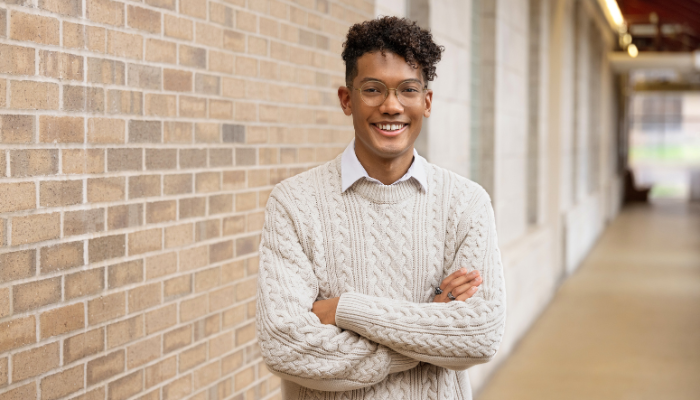Sebastian '26

School of Education
Major: P-12 School Counseling (Master’s Program)
Minor: Education Studies
Orange Trivia: Has participated in SU Run Club, IIDA Syracuse Student Chapter, Chi Sigma Iota Counseling Academic and Professional Honor Society International, Ottothon and as an Orientation Leader.
“Giving’s importance is in its impact on others, where it can provide resources, facilities and a foundation to support others who may be without them.”
Describe your Syracuse experience.
From my past five years at SU, I’ve had the opportunity to witness professional and personal growth in myself. I’ve had the chance to experience this university as a design and counseling student with both lenses, allowing me to grow in my appreciation for what is offered here. There have been opportunities to get involved, be proactive in my pursuits, and grow in relationships with people across not only this country, but globally. All of these factors, along with a multitude of shared experiences, involvement and course content, have shaped me into a progressing person.
During my time here, I’ve taken up activities that align with my interests and gotten involved in ways I never expected. Two of note are Orientation Leading and Run Club, which have helped me grow in a deeper connection with this university. Each of these was a fulfilling experience outside of my usual classroom/lecture settings.
How is the School of Education preparing you for your future career?
Since beginning my Education Studies minor in 2021, I’ve had the unique opportunity to be educated on impactful topics and history in my field. Numerous courses exposed me to innumerable impacts and factors that influence educators and individuals working with students. One key aspect that gave me a greater outlook was the systematic factors and how these systems have had long-lasting effects on marginalized communities. This, combined with the professors and faculty, has created an enriching experience. From semester to semester, I was able to experience distinctive approaches to teaching and working with students, with each professor, teaching assistant and doctoral student providing critical teaching and feedback, which has played a role in my work to be a future counselor. From topics on marginalization, disability studies and redlining to risk assessments, theoretical frameworks and the vast cultural dimensions of every individual, I have learned how to handle my present and future as a school counselor.
Have you done any internships, and how has that impacted you?
A requirement of my program is to be placed at a school and work as a school counselor to apply and practice what my courses have taught me. I recently completed my first placement at West Genesee Intermediate School, working with 5th and 6th graders. Under the guidance of an onsite supervisor and a doctoral supervisor, I was able to get a first-hand look at the day-to-day tasks and requirements of being a school counselor. This experience had an immense impact on how I viewed and acted as a counselor. One takeaway I had while at my first placement was the difference between studying for something and being put in situations where you must put it into practice. The School of Education, along with my professors, has provided me with the basis of knowledge that I’ve been able to apply in my internships. My education, an internship and my classes worked in a unique way where one informed the other. When in class and learning about play therapy, I think, “How can I apply this to a student I’m working with?” or “Which students might benefit from this, and which ones could this not work successfully with?” I can then go to my site, apply my knowledge and test some things out since I’m still in practice and have the support of my professors, doctoral supervisor and site supervisor. This also works on the other end while on site at my internship. I may work with a student and find myself in a spot where I may not know how to continue, or something may go over my head. With this in tandem with my education, I can go to class and collaborate with others, or look to topics discussed in my courses, which work to continue my learning process wherever I go.
What does it mean to you to be Orange?
When I think of being Orange, I immediately think of a culture of supporting others. It means being surrounded by a community and involved in creating change while providing the platform and resources to do so. We are encouraged to hone in on our strengths while also building and ironing out our areas for growth. Each individual takes this up in their own unique way but is encouraged to push forward and make it their own to create a person who is prepared for their future and full of promise.
